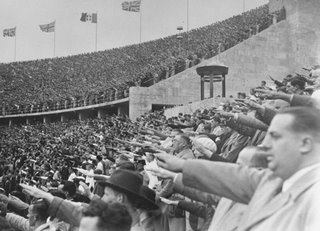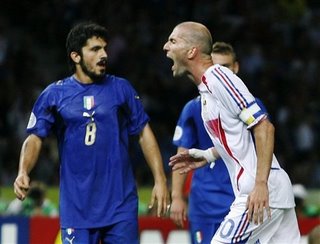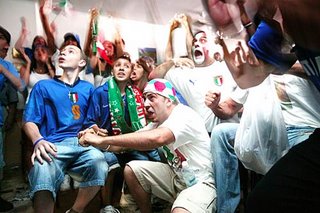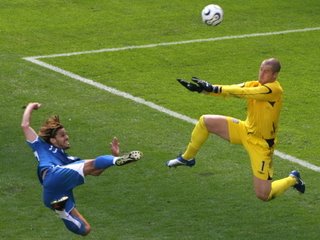Full circle



A Wikipedia article is saying:
[Zinédine Zidane's] career ended on a sour note when he received a red card and was ejected after headbutting Italy's Marco Materazzi in the chest in the 110th minute. ... His team members later reported to French media that Zidane was reacting to a racial slur from Materazzi. The Italian side has catagorically denied that Materazzi had any role in the provocation of Zidane, but both the French coach and many other members of the media believed that Zidane had snapped due to Materazzi.Like most Wikipedia entries that just plagiarize news articles, it turns out the source for the entry is FOXSports.com's Jamie Trekker: "According to members of the French media, French players told them that Matterazi called Zidane a racial slur which prompted the headbutt."
From the Australian Broadcasting Corporation: "Meanwhile World Cup chief organiser Franz Beckenbauer said Zidane must have been provoked. "Something must have been said to Zidane. He is actually a reserved and inoffensive person," Beckenbauer said."
Here's the Guardian: "He had surely been provoked - there were suggestions last night that Materazzi had called him "a terrorist" - but Zidane will be right to curse his stupid reaction."
Wow. I just found out today that Zidane's parents were Algerian immigrants to France; the Wikipedia article also says Zidane describes himself as a "non-practicing Muslim."
Well, this changes everything. Yeah, Zidane may still be a hothead--but now there's a context within which to put his reaction. This is no longer a story about Zidane, it's now about racism in sports.
There's a long history of white players using racial slurs to try and get an unfair advantage on the field. The governing bodies usually turn a blind eye to it--and of all sports, soccer has had a particularly bad track record on this issue.
So what usually happens, as in this case, is the white player wins. He gets to the non-white player, who as a human--with emotions the athlete is not always in control of--responds, which of course is what the officials see.
In sports like soccer it's as if non-white athletes are always playing with a 10-pound weight around their neck--who knows when the guy next to you will slug you below the belt. Whites aren't hit by racism the same way; for a whole host of historical and political reasons, calling a white guy a cracker simply doesn't have the searing effect that using the N-word has.
And so it goes--time after time in sport after sport, it's always the non-white athlete who is expected to have thicker skin and put up with more than white athletes, always the non-white athlete who is turning the other cheek, always the non-white athlete who is told to keep it inside of him, it's just words.
Until we know more about what the Italian player said or did not say to Zidane, I'm not sure what to think of Zidane's reaction. There are certain situations where any adult male knows a physical response is warranted, even expected.
If the Italian player put Zidane in one of those areas, the blame and any penalty should fall on the Italian player--even in the eyes of the law, let alone the culture that is sports, there are actions that, while normally banned, are justifiable depending on context.
To say mere words should never warrant a physical response is naive and again, places all the burden on the non-white individual since it is always going to be non-whites who have to show restraint. It's always easy to say 'he should've just' when you're not the being screamed at.
Not to mention what right does any member of a group that's always the ones guilty of using words have to judge a person who's always on the receiving end? You may as well pass judgment on the Jews for how they responded or did not respond to the Nazis.
Some Italian fans are being quoted tonight that Zidane's expulsion makes their victory bitter-sweet; since he played in Italy on the club many Italians revere him. Hopefully those same fans will still feel a bit sour if it turns out there was a racial incident.
Any fan of Italy who doesn't feel like this incident tarnishes their victory is an idiot (although given the country's history, there may be some who think this enhances their win). Heck, given that Materazzi scored the Italians' only goal in regulation, I wonder how his teammates feel knowing that they may have well won the World Cup because of a racist?
I guess it's only appropriate--given the amount of racism white Europeans are showcasing in society-at-large, why should we expect the sporting field to be magically exempt?
It's amazingly ironic because Fifa has not only started every match at this World Cup with both teams standing in front of 'Say No to Racism!' banner, and had star players reading (in multiple language) a statement against racism, but it's also said at this World Cup that it was going to penalize the team of any player that used racial slurs (Fifa to use World Cup to fight racism is among many articles that mentions this).
Fifa said we can't and won't stop fans from throwing bananas at non-white players, but don't worry--it's the 21st century, so guess what--we've decided it's time to stop coaches, officials and players from openly racist behavior.
Well, here we have it. Anyone think Sepp Blatter and his Fifa cronies are going to take any action? After all, we know that the refs consider a head butt a serious enough offense to warrant after-the-fact video review.
If they really wanted to send a message about zero-tolerance for racism, take away Italy's trophy. Sure, people would call it a harsh overreaction--but it would probably end racism on the playing field on the part of the players. Isn't that a worthwhile goal that's worth some pain, or is too much at odds with always expecting the non-whites to make the sacrifices?
At the very least Fifa should check the audio for racial slurs and publicize what you hear. But somehow I think Fifa will live up to its long tradition of empty words.
Think I'm harsh? Check out the first few paragraphs of an article in the Irish Times (there was just no Jesse Owens in the winner's circle this time):
On the dark stone slopes of Hitler's stadium the flashbulbs popped and a heedless generation sang Que Sera Sera as they waited for extra time to begin. Then all hell broke loose, writes Tom Humphries in BerlinReuters photo of Materazzi by Dylan Martinez via Yahoo News.
This was to be the game that put history to rights. In the stadium where Jesse Owens dealt with racism 70 years ago, the issue rumbled on last night as Italy won the World Cup for the fourth time and the first time since 1982.
The story though was Zinedine Zidane, whose personal journey in this campaign has been from superstardom to comic book superhero to villain/martyr. Deep into extra time last night Zidane tussled innocuously with Marco Materazzi, the Italian defender. Some words were exchanged. Zidane trotted ahead of Materazzi, eyed him up and stepped forward, delivering an astonishing headbutt into the Italian's chest.
The implication immediately was that there had been racist words exchanged. A French Algerian, Zidane is descended from the nomadic Kabyle tribe of north Africa and has fronted anti-racism campaigns in his native France.
Reuters photo of Zidane by Alessandro Bianchi via Yahoo News.
Uncredit photo of German fans at Berlin Stadium during the 1936 Summer Olympic Games via The History Place.

















